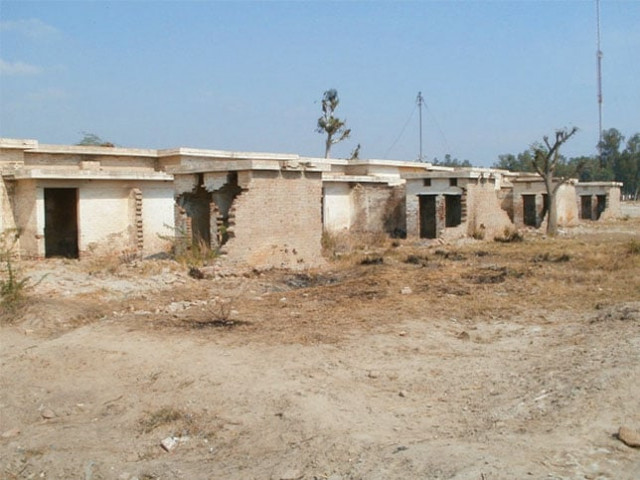For drought-hit Thar, distant rains and far-off floods pile on misery
Subsidised wheat distribution called off in Tharparkar.

Those living in Tharparkar have become an inadvertent casualty of the floods caused by widespread showers in September. The recent catastrophe has shifted the attention of the relief authorities from the drought-hit district.
While the government was quick to declare the calamity in Thar in August as the district did not receive rain from mid June to mid August, it has also halted the distribution of subsidised wheat quickly too.
The distribution was called off on October 4 by the Thar district food controller, Abdul Sattar Memon, on the directives of the department’s deputy director. But the district administration and the relief department were, according to the officials concerned, not consulted. This has happened despite the government’s announcement that subsidised wheat will be distributed till the next monsoon season.
Around 1.5 million people live over 2,300 villages in Thar scattered across 19,639 square kilometres. The food department has 12 depots in the five tehsils of Thar from where subsidised wheat is sold. Under the relief package, each family was to receive 50kg of wheat every month at Rs15.5 per kg. The government had also offered to contribute 50 per cent cost of the transport - it later became one of the reasons to stop relief work.
The government planned to distribute 128,000 bags of 100kg over the next eight to nine months, starting from September 1, according to Memon. By October 4, 30,700 bags had been handed over to the people. “The food deputy director sent a letter ordering closure of the wheat depots and stopping the [wheat distribution],” the official told The Express Tribune.
Livelihood
In Thar, people and their livestock both survive on rain-fed agriculture. Around 200 to 300 millimetres rain between June and August is must to cultivate some main crops, including bajra (millet), guar (cluster beans), moath (kidney beans) and moong (lentil), says a local agriculturalist, Krishan Sharma. Usually the people make bread from millet but during drought, they have to buy wheat, says a teacher based in Mithi, Ashok Suthar, also a rights activist. “Without government’s help, the people are now paying up to Rs34 to Rs36 per kg of wheat which they cannot afford.” Scattered rains in September had brought a fleeting respite for the Tharis. The pastures became green again and the people could find fodder for their livestock. But Suthar says the situation will not last more than a month.
Officialdom
The Sindh government’s adviser on relief, Haleem Adil Sheikh, was not aware of the suspension or termination of the relief activities in drought-hit Thar. “I will initiate an inquiry,” he said when asked to explain whether the food department can act without consulting the relief department or the district administration.
Food officials were ordered to release wheat while the district administration was to foot the transport bills, he said. “I have to find out which was stopped first.”
Three different things have cropped up as the “unofficial” reasons behind the decision to call off relief: rains, floods and transport costs.
“The [flood] situation in upper Sindh worried the government which wanted to ensure that there is enough wheat supply for those people,” says a food official.
The district officials, on the other hand, cite unpaid transport bills as the main cause.
For the last drought alone, the transporters have claimed over Rs20 million in arrears. “We worked throughout the drought in 2009 but the government has not cleared our dues yet,” says Sanaullah Nohrio, the owner of Nohrio Transport Company, who is claiming Rs3.9 million in bills.
Amid these grumbles, the people living in remote villages also complain about discrimination in wheat distribution. The urban population in Mithi, Diplo, Islamkot and Chahcro were the main beneficiaries of subsidised wheat, alleges Obhayo Junejo, who lives in Nagarparkar.
The district administration has refused to shoulder the responsibility of freezing relief activities. The additional deputy commissioner, Tahir Memon, pointed the finger at the food department. “The letter was addressed to the district food controller,” he said. “We just received a copy of it.”
Thar deputy commissioner Makhdoom Shakeeluz Zaman also did not know why wheat distribution was stopped. “We are again surveying [the drought conditions in Thar] and a report will be sent to the Sindh government in a week.”
Published in The Express Tribune, October 16th, 2012.



















COMMENTS
Comments are moderated and generally will be posted if they are on-topic and not abusive.
For more information, please see our Comments FAQ